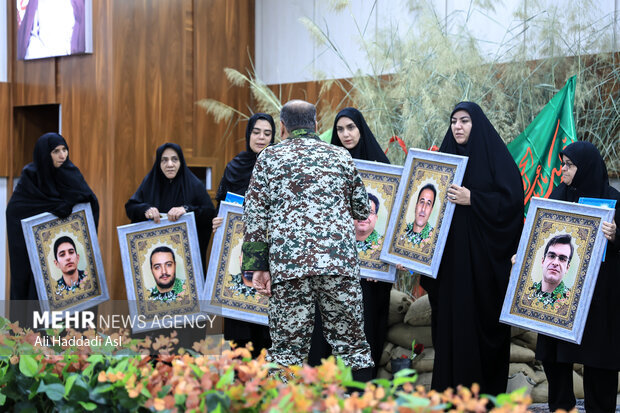‘My father, then my husband’: One woman's sacrifices for Iran

TEHRAN – Soraya Kazemi is among the thousands of Iranian millennials who lost their fathers during Iraq's invasion of Iran. Her father, a soldier at the time, passed away shortly after being exposed to Saddam Hussein's chemical weapons – weapons that were provided by Germany, and put to use based on American intelligence.
“My father was martyred when I was four. Living without a father was hard. But I learned to live with his memories, even if those memories weren’t mine,” she explained.
When Soraya was in her early 20s, she met Gholam-Ali Najafi, a young member of Iran's Army. They married in the early 2000s and went on to have three children: two daughters and one son. I asked if she hesitated at all to marry a military man, given her experience of losing her father. "No, I wasn't concerned about the dangers of his job," she replied. "That’s because I didn't really think that we would encounter another war after the one with Saddam."
Soraya explained that life with a member of the military, nonetheless, still presented its challenges. Gholam-Ali served in the Army's air defense unit, which required him to move to different provinces and work long hours. "He was a good husband and father, but work was still his number one priority," she said. "He told me that he had a big responsibility as a member of the Army, and he must do anything he can to ensure the safety of the Iranian people."
Despite the birthdays, New Year celebrations, and difficult days she had to spend apart from her husband, Soraya was still thankful that at the end of the day, she had him by her side. But reality had proved different on the Wednesday morning I met her at the headquarters of the northern unit of Iran's Air Defense Force. We were there for a ceremony honoring the seven servicemen martyred during Israel's June war against Iran. One of the martyrs revered that day was Gholam-Ali, Soraya's beloved husband.
Second Brigadier General Gholam-Ali Najafi had become a well-respected figure within Iran's Air Defense Force over his nearly two-and-a-half decades of service. He was particularly known for dedicating his life to the defenses surrounding the Fordow nuclear site, near the Iranian city of Qom, one of his colleagues told me. "General Najafi had devoted his life to safeguarding Iranian nuclear sites. Most recently, he had become a member of the logistics team," he added. General Najafi was martyred on June 15, the third day of the war, during the enemy's strikes on Fordow. It was unclear to me whether he was repairing the damaged defense systems or operating one of them at the time of the attack.
Years after losing her father, Soraya has now lost her husband to the same forces. Just as Saddam was a proxy attacking Iran on behalf of the U.S., so too was Israel, which struck Iranian nuclear, military, and civilian infrastructure during 12 days of illegal and unwarranted aggression.
"Even when the war had started, I didn't think I would lose my husband. When I talked to him on the phone, he was always in a rush, but he didn't seem scared or anything like that. I later found out that anyone who was in air defense units knew they were the first in the line of fire,” she stated. "I cannot tell you that losing my husband hasn't been difficult. We have spent extremely difficult days during the past couple of months. But at the same time, I know Gholam-Ali sacrificed himself for something he loved the most: his country and his people.”
Speaking to Soraya and some of the other family members of the martyrs during the ceremony was deeply emotional. Watching the videos that the headquarters had prepared and displayed during the ceremony was also profoundly sad. Like Soraya, I found it difficult to accept that people had died in a war that took place in 2025. But when I looked at all the soldiers present, most of whom had worked alongside the martyrs during those 12 days, I didn't see sadness, regret, disbelief, or fear. I saw determination.
"There was a soldier who served during the 12-day war. He was completing his two years of mandatory military service, which all able-bodied men in Iran must fulfill," said one of the commanders present at the ceremony. "He was scheduled to be discharged last week. He came to me crying, saying he didn't want to leave because he had heard that Israel might attack Iran again soon. I only discharged him after he made me promise him that I would take him back if another war occurs," he told me.
The commander emphasized that while the military mourns its martyrs, no one believes the fight is anywhere near over. "What they want is for Iran to give up all its power, not just its nuclear capabilities. They want our sovereignty and integrity," he explained. "But I want the people to know that we are ready. We have never been more prepared to defend our country.”
He added that since the war halted on June 25, Iran has both increased its strengths, and addressed its weaknesses.
Leave a Comment